Examining Kamala Harris' "Progressive Prosecutor" Record
Harris is a jailer and a cynic. That's bad and good.
Last week, a reader sent me this question:
Hey Joe! Could you explain Kamala Harris’ record as a prosecutor? After five years of flip-flopping, Republican attacks, and her embellishing and then downplaying her career, I don’t know what’s actually true. Thank you!
This is a crucial question that has yet to receive the attention it deserves from traditional media. Since announcing her 2020 presidential bid, Kamala Harris has presented a complex narrative of her three decades as a California prosecutor. By critically examining her actions as San Francisco District Attorney and California Attorney General, we can gain a clear understanding of Kamala Harris and her role in America's mass incarceration crisis.
Understanding Kamala Harris’ career is essential not only for those who will use it to inform their voting decisions come November, but it is also helpful for activists who seek to extract policy concessions from the Presidential hopeful. Fortunately for the latter group, Harris’ record shows she can be swayed if convinced it is in her political self-interest.
Kamala’s Early Career
After graduating from Howard University and the University of California Hastings College of Law, Kamala Harris returned to her hometown of Oakland to begin her career. In 1990, she joined the Alameda County District Attorney’s Office. Within four years, she was appointed to the Unemployment Insurance Appeals Board and California Medical Assistance Commission by the Speaker of the California Assembly, Willie Brown. Brown and Harris were dating then, creating a nepotism scandal that follows her to this day. These appointments had a lasting impression on Harris, as white-collar and healthcare prosecution would remain her forte and eventually springboard her political ambitions.
In 1998, she became the Assistant District Attorney of San Francisco. Six years later, she was elected District Attorney, ousting the incumbent, Terence Hallinan, who was broadly considered inept. Harris ran against this incompetence, pledging for a better working relationship with the police. She won and realized her pledge, drawing praise from the cops.
“Harris’ office tries to work with the Police Department in a way that Terence Hallinan never did." - Gary Delagnes, Head of S.F. Police Union, 2006
Unlike her predecessor, Harris was determined. She tightened bail restrictions, increasing the number of people sent to jail.1 Her office routinely celebrated its 90% conviction rate. Most infamously, Harris chose to prosecute the parents of truant school children, believing that curtailing chronic truancy would reduce crime and incarceration. While her threat was widely publicized, from 2006 to 2009, Harris’s office prosecuted a mere seven parents. None were incarcerated. Harris claimed the policy was a success, pointing to a 23% drop in elementary school truancy during the period.2 However, truancy decreased by 4% for middle school students and increased by 2% for high school students, indicating the policy was more commotion than anything else.
Halfway through her first term, Harris’ cozy relationship with the police began to sour. Having run for office opposing capital punishment, Harris stuck to her promise and declined to seek the death penalty for a man convicted of killing a cop. The police were also angered by her decision to use plea deals to clear the backlog of homicide cases left by her predecessor. While she was criticized as being “soft,” the average sentence for those offered deals was 24.5 years, which is far from lenient.
During her tenure as San Francisco D.A., Harris’ political ambitions sprouted. She became active in the state’s Democratic Party, attended the 2004 Democratic National Convention, and allied herself with then-rising star Barrack Obama. She had campaigned for D.A. on a unique brand, promising to combine San Francisco liberalism with the country’s “tough on crime” attitude. “Smart on crime” was her mantra, which manifested in harsh prosecution with an aesthetic of progressivism. Harris proudly defended San Francisco’s Sanctuary City status3 and opened adult probation offices that lowered recidivism rates. She was a vocal advocate for the Gwen Araujo Justice for Victims Act,4 which prevented the use of “trans panic” defenses for those accused of murdering queer sexual partners.
As San Francisco’s District Attorney, Kamala Harris molded the image of a “progressive prosecutor.” While that term has been frequently used to describe an alternative approach to prosecution, as Harris’ career shows, it’s a veneer of empathy on a cruel, inhumane system.
Career Ambitions
In 2011, Harris became the California Attorney General, making her the head of the largest state justice department in the country. By this time, her hands firmly grasped the first wrung on the political ladder. From 2011 until she entered the Senate in 2017, Harris undertook a two-pronged approach designed to maximize her name recognition and accrue political capital. She:
Prosecuted high-profile white-collar crimes, making herself a household name, and
Continued California’s harsh carceral policies to protect herself from future “soft on crime” political attacks.
As California Attorney General, Harris rode the post-Great Recession populist wave by cracking down on corporate violations. She obtained the largest Medicare fraud settlement in California history ($323.7 million),5 recouped $1.2 billion from for-profit colleges for false advertising,6 sued Apple, Google, and other leading tech companies for privacy violations, and prosecuted Volkswagen for its infamous emissions-cheating scandal.7 She also helped pass and enforce the California Homeowner’s Bill of Rights, which helped struggling owners defend against predatory foreclosing.8 With each case, her national stature rose. But Harris’ populist approach was calculated, and not without limits. She declined the California Justice Department’s recommendation to prosecute OneWest Bank CEO Steve Mnuchin for “widespread misconduct” in illegal foreclosures. Mnuchin, who would later serve as Donald Trump’s Treasury Secretary, donated to Harris’ political campaign in 2016.9
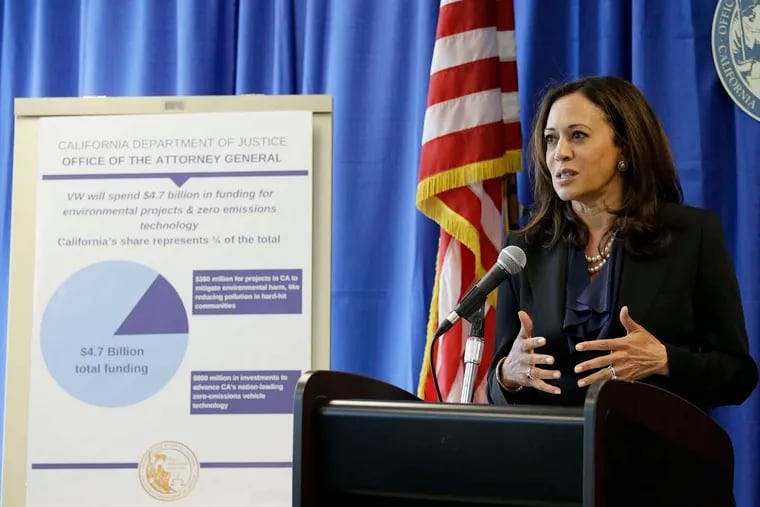
While Harris built a national persona as an advocate for the common American, she also made sure she protected herself from accusations of radicalism or softness. The cost of her “cover your ass” approach was paid by the thousands of Californians she locked up in the state’s draconian prisons.
In 2010, the Supreme Court ruled in Brown v. Plata that California prisons were so overcrowded they constituted cruel and unusual punishment. Kamala Harris fought back, refuting federal oversight and refusing to release prisoners early, citing a need to use prison labor to fight wildfires.10 The attempt to spin a human rights violation into a positive response to an environmental issue (which was getting national attention at the time) shows that Harris’ predominant interest has long been building support among the national Democratic party and voting base. She also refused to reexamine the cases of wrongfully convicted inmates, including one man who is still on death row.11
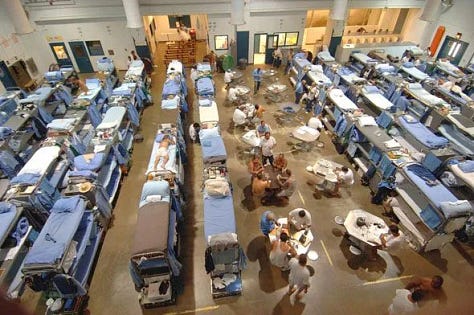
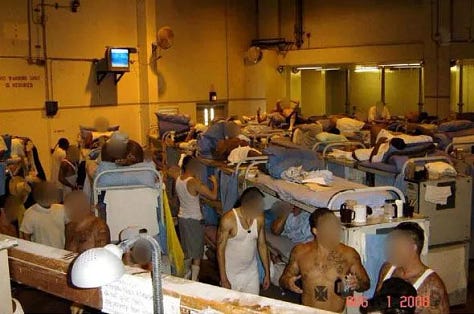
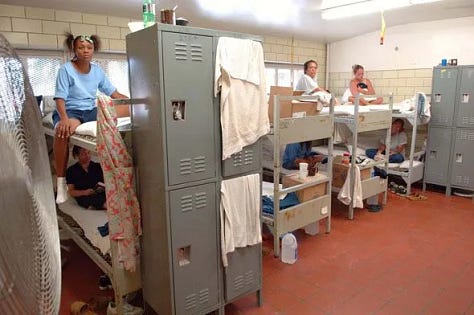
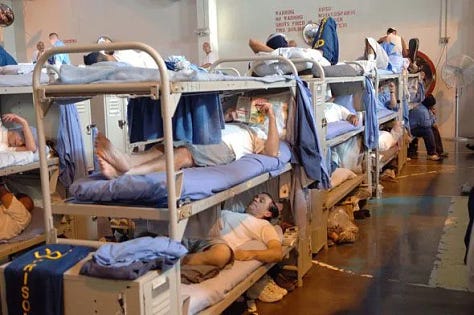
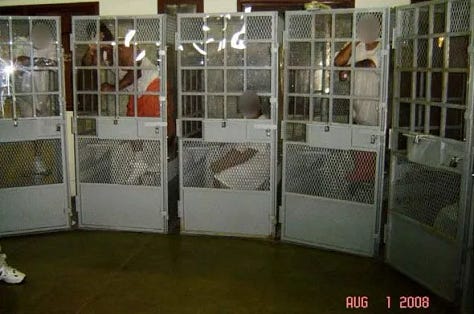

In 2015, the Legislative Black Caucus called on Harris to support bills mandating police body cams, but she punted, saying that was the decision of local police departments.12 On queer rights issues, Harris spoke outside both sides of her mouth. While she called Proposition 8, which banned same-sex marriage “unconstitutional,” she also appealed a federal ruling that one of her prisoners be allowed gender-affirming surgery.
From a mile-high view, Kamala Harris’ tenure as California Attorney General appears to be an enigma. She’d begin her week by suing polluting automakers and predatory banks, but by Friday she was advocating for killer cops and refusing to release immiserated non-violent offenders. For everything Kamala Harris did that could be considered good, there’s two things that are indefensible. Without excusing her culpability, Kamala Harris was indeed a “progressive prosecutor” in every sense of the term.
While there’s been a recent push for more lenient District Attorneys and Attorney Generals across the country, Americans should hold no illusions about what such a moniker entails. Yes, it is good that Kamala Harris sued Volkswagen and helped people avoid homelessness, but to do so, she willingly became a cog in the machine that makes the United States the world’s leading jailer.13 A prosecutor can be as socially progressive as possible, but at the end of the day, they’re still locking human beings in cages; an act that should be an absolute last-resort.
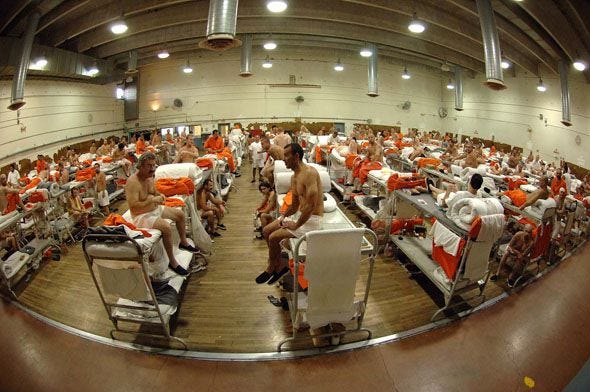
When I embarked to find Kamala Harris’s prosecutor record, I ended up finding a life-long political campaign. Ever since she became the San Francisco D.A. in 2004, Harris has been guided by whatever decision would acquire her the most political capital at the time.
“A lot of people say she coasted into the Senate position,” said Jeff Adachi, a former classmate of Harris’ who faced off against her as a public defender. “No, it was because of the political capital she built from those other races. Since then, she has been able to take the political capital and amplify it. And she’ll do it for every office she’ll run for.”
This is the best way to understand Kamala Harris. She’s a liberal cipher, willing to shape-shift herself into whatever form best elevates her electoral chances. As the Democrats have moved to the social left over the last two decades, Harris has moved with them, but has never risked stepping an inch too far. Now that she is the Democratic Presidential nominee, we can assume her strategy will remain constant. While her prosecutorial record is unforgivable, it does show she will do whatever she believes is in her best interest. For the activist left, this offers a glimmer of hope. If Kamala Harris can be convinced progressive policies — a ceasefire in Gaza, expanded welfare programs, continuing Biden’s anti-monopoly actions — are her best chance at becoming the first women President, she will champion them.
But regardless of the policies the Harris-Walz ticket puts forth, don’t expect her to believe them. As her career in prosecution shows, Kamala Harris only believes in herself.
If you found this article valuable, subscribe so you don’t miss future ones. You can support my work by liking (click the ❤️), sharing on social media, and sending this article to a curious friend. Thanks for reading — Joe
https://www.sfgate.com/politics/article/Trials-and-tribulations-of-Kamala-Harris-D-A-2521498.php
https://www.sfgate.com/opinion/article/Fighting-truancy-yields-big-dividends-3295152.php
https://www.nytimes.com/2006/11/12/us/12sanctuary.html
https://abc7news.com/gwen-araujo-documentary-transgender-murder-movie-trans-panic-defense/12451012/
https://legalnewsline.com/stories/510527871-harris-323m-scan-settlement-record-recovery-for-calif-program
https://www.sacbee.com/news/politics-government/article2579497.html
https://www.sfgate.com/business/article/Judge-approves-Volkswagen-state-settlement-over-9198583.php
https://www.cbsnews.com/news/calif-attorney-general-kamala-harris-fights-for-struggling-homeowners/
https://www.cnbc.com/2019/01/26/kamala-harris-has-complicated-history-with-wall-street.html
https://prospect.org/justice/how-kamala-harris-fought-to-keep-nonviolent-prisoners-locked-up/
https://deathpenalty.org/update-on-the-kevin-cooper-case/
https://www.latimes.com/local/politics/la-me-pol-ca-harris-police-shootings-20160118-story.html
https://www.prisonpolicy.org/profiles/US.html


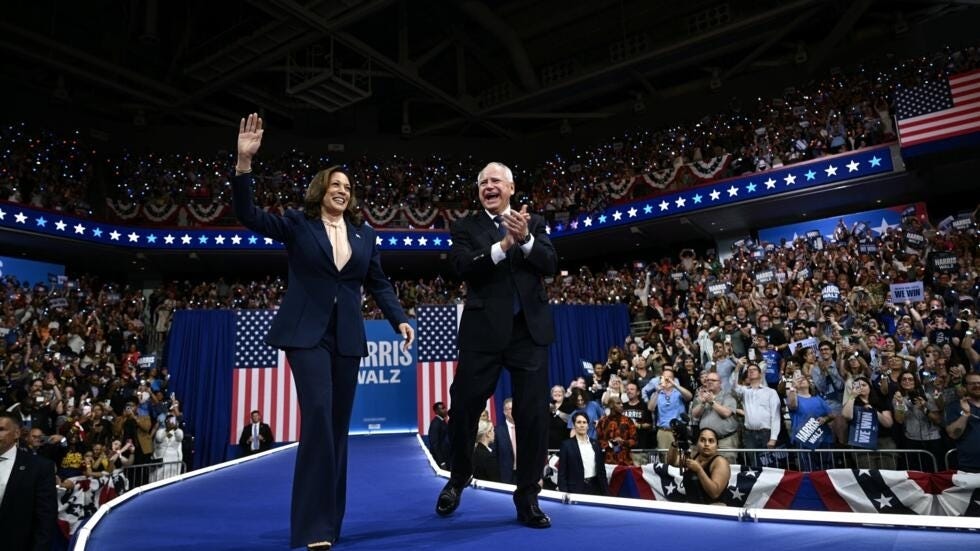
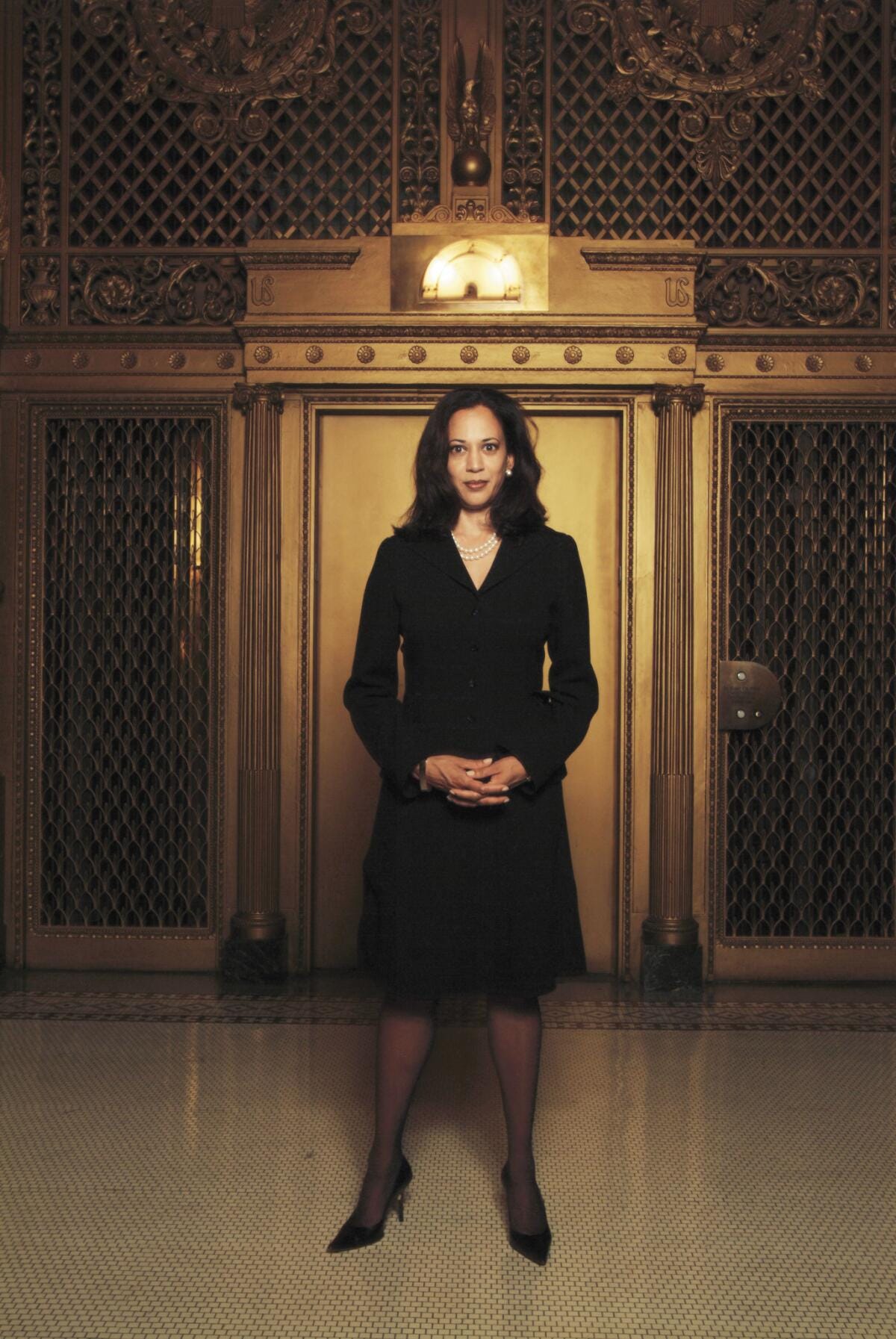

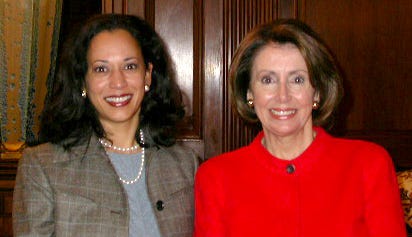
Nice summation of her career and policies. Having lived in CA during many years of her tenure it was apparent really on that she was a very shrewd opportunist, with a record that reflected her ambitions.
Very useful summary. Thanks for writing!